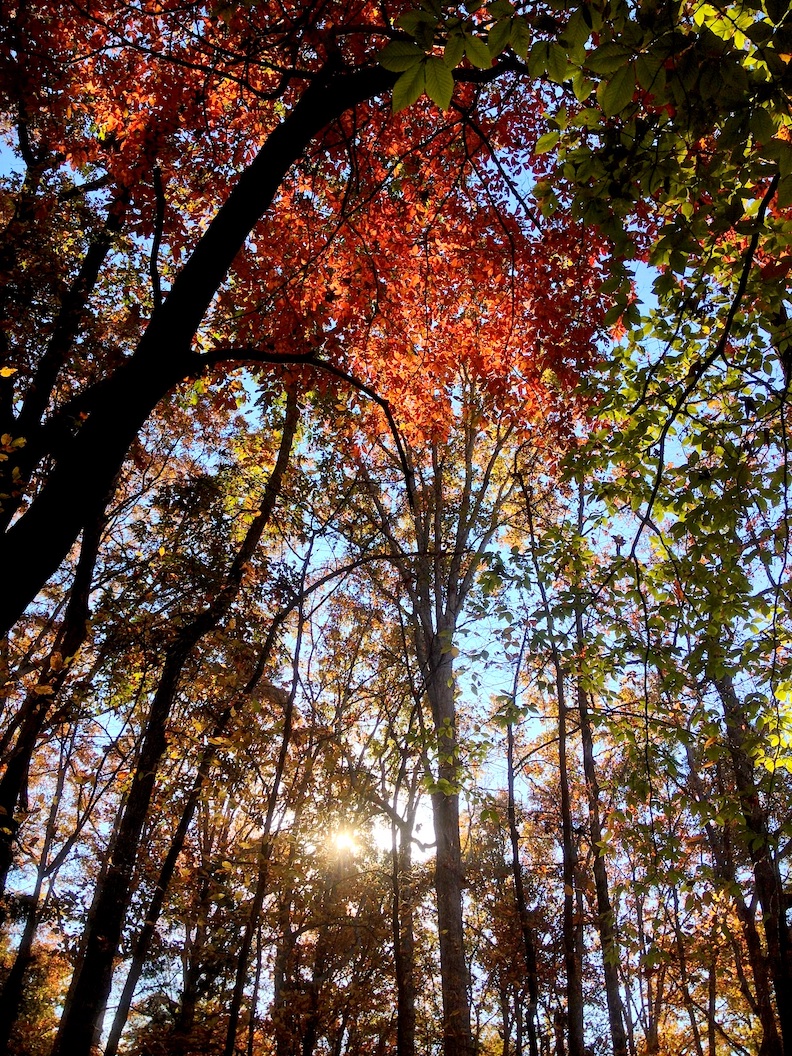Sinners List
How do we reconcile a belief in forgiveness with years of public shaming?
The day that our handyman committed suicide, he cleaned out my parents’ garage. They hadn’t asked him to purge the junk from those overstuffed car bays, the ones that hadn’t sheltered a vehicle since we moved in, but Harold saw that it needed to be done. He left the garage doors open so they would see it when they drove up the long, windy driveway.
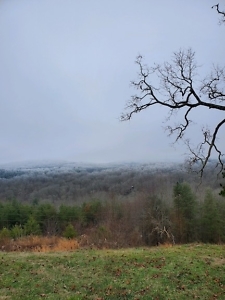
When my parents first moved me and my two sisters to the little Appalachian town of Blue Ridge — back in the 90s when it was untouched by tourists and developers — we couldn’t afford a handyman.
I’m still not completely sure why my parents moved us from the manicured Dallas suburbs to a place where the majority of my classmates qualified for free or reduced school lunch. Or where an entire family showed up barefoot at the elementary school during my first-grade open house. Or where, having our classroom door ajar because the AC was broken, my teacher once accidentally let in an escaped hog while we were trying to learn fractions.
All I knew is that my dad missed the mountains where he’d grown up, and so he’d left his high-paying accounting job in Dallas, Texas, to live in Georgia without a clear sense of how to make a dollar.
In maybe the most fanciful move of his life, my dad opened a coffee shop amongst the plywood-boarded storefronts of downtown Blue Ridge. He was a man who pronounced Italy, “It-ly,” and couldn’t tell a Costa Rican Arabica bean from a burnt Folger’s, but he had a hunch that tourists were coming, and he was pretty sure they liked lattés.
My dad was right — eventually tourists descended on the town like locusts — but not for at least a decade, and the business tanked, leaving my sisters and me to offer up our own allowances to help when we heard my mother crying one night about the bills piling up.
Eventually, though, my dad did figure out how to make a living, by using his accounting skills to analyze analog phone bills for hospitals, of all things.
That was when we adopted Handy Harold. Or maybe he adopted us.
***
I think the real low point came when my dad “fixed” my bedroom window that wouldn’t close by wedging it shut with my toy bow and arrow. Or maybe it was how proud he was of that improvisation until the bow finally snapped.
My dad first hired Harold to reassemble a swing set that had made the trip with us from Texas. From our suburban fescue lawn, it was transferred to a spot 200 yards into the woods, between blooms of pink lady slippers, because it was the only flat surface around our little forest-nestled ranch.
Harold was in his 40s at the time, but looked older, built slight with a large nose that was bumpy and red from sun exposure, and a deep but nasal-y voice with an accent.
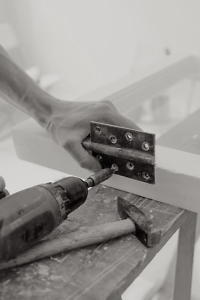
My dad said that Harold had served in the U.S. Army and that he’d finished high school, not an assumption to safely make in our part of the world.
Once Dad hired Harold to fix a wonky outlet in my bathroom, and when he did, he gave me a tutorial.
“Now, when you want to plug in your hair dyer, you need to press the red ’reset’ button first,” Harold said.
“Okay,” I said, ready to get out of the small space we were sharing.
“So, just press that red button, and then it will let you plug things in.”
I glanced at him. “Got it.”
It occurred to me at that moment, with Harold feeling the need to belabor the obvious, that Harold thought he was smarter than me. At the time it seemed silly. I was in the gifted class.
But today when I look back, I realize that he might have been right.
Harold could build a sturdy flight of stairs up to the attic, where there was only a ladder. He could replace a rotted post from beneath the deck without collapsing the whole structure. He could paint a wall so uniform it looked like it had been picked up and dipped in Cappuccino White No. 4 rather than stroked, inch by inch, with a brush.
***
Eventually my dad started making more money. We got a new-to-us minivan, which my parents purchased at a discount because it had been keyed down the length of its right side. My dad’s business got better. He paid Harold to paint the basement, to stain the deck, to fix the leaky faucets.
My dad bought a small rental property, then another, and started using Harold to repair those, too.
When we moved into our new house, my dad had Harold put screening around the front deck, complete with “underdecking” to keep the bugs from getting in through the gaps between the slats of wood on the floor.
My uncle helped Harold make a YouTube video showcasing his work on the deck, with birdsong edited in as the camera panned around our deck.
I made a joke to my dad, “I heard Harold’s video went viral!”
Dad looked up. “Really?”
I felt a twinge of guilt all of a sudden. “No,” I said, looking at my shoes, “not really.”
***
Dad helped him make business cards with “Handy Harold,” on them, but he never got much work beyond my dad. Harold was awkward, and as we would discover later, he had a history.
Later we saw his face in the paper.
It’s Georgia law that sex offenders register with the state each year, but in Blue Ridge, the local paper also publishes current and former offenders, with their name, age, and photo. And there was Harold, with his big, bumpy nose and kind eyes.
My dad, to his credit, didn’t ghost Harold. He called him into his office and asked about it.
My dad said that Harold got quiet. That he couldn’t respond.
So my dad called the sheriff, an old buddy of his from high school. Could he tell him what Harold had done?
“Legally, no, but I’ll tell you it was on the lesser end of the spectrum. And it was 20 years ago.”
I don’t know what the lesser end of the spectrum would be. Indecent exposure? Groping?
My dad is a Christian and a conservative, and also someone who spent the better part of my grade school years writing to congresspeople about the evils of abortion on our old dial-up internet connection in the basement.
At the same time, Harold had done everything he ever asked. He had worked for our family, around me and my sisters, for at least a decade without any problems.
Dad agonized, eventually keeping Harold on to perform tasks when a house was between rentals, but never letting him change the locks.
***
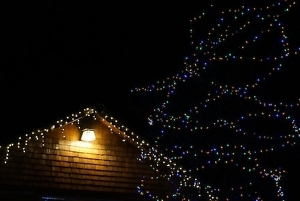
Years later, when I’d come home from college in Athens, Harold was putting up the Christmas lights on our house. When he’d finished, he came inside and interrupted my Skype call with a friend.
“Is your mom home?”
“I think she went to the store,” I yelled from the couch.
I heard his feet shuffling behind me, and I startled, thinking he’d already gone back outside. “Well, I just wanted to make sure she liked the lights.”
“Oh, okay, I’ll ask her when she gets back,” I said, turning back from my laptop.
He didn’t move. “I did the white string of lights along the deck, but then I decided to do the colored lights on the tree out front so the cars could see it.”
Finally it dawned on me that he was looking for affirmation. I stood up and went to survey his work.
“This looks really awesome, Harold. I’m sure she’ll love it.” I tried to effuse. “Like what you did over here.” I waved at one of the trees.
He smiled a bit then and finally turned to walk back to his weathered old pickup.
***
Later during that same Christmas break, my parents received an $800 water bill and realized they had a leak. We turned off the water completely and were told we’d have to put in a new line all the way down our big hill to the waterline by the street, which would take at least a week.
But Harold pitied us in our first-world problem and decided to help out. He used a post digger to install the new pipe by hand, a task that makes my shoulders ache just to write about.
Our dog at the time loved Harold, and by the end of his 36-hour emergency plumbing fix, Dash had sprained his tail from wagging it so much and had to be medicated.
“Thank you so much, Harold,” I told him. “You saved our lives,” I said, ready this time to provide the praise he needed.
But he looked exhausted. “It was a lot of work,” was all he said.
***
When my husband tries to tell me, now, that he also came from modest origins — “we took one week-long vacation to the beach each year, that was it” — I pat him on the knee and remind him that I didn’t see the ocean until I was 12.
Then I tell him about the night my dad backed into a propane truck at the gas station, and for months we drove around in a half-crumpled minivan, like a Coke can someone had tossed in the recycling, because money was too tight for a brand-new rear door.
But of course, compared to Harold, our deprivation was fleeting and mild. A frost, not a deep freeze. When my parents couldn’t afford braces, my grandmother offered to pay for them. My maternal grandfather, a TV repairman, somehow scraped together $10,000 educational CDs for me and my sisters to spend on college.
My family had a safety net to fall back on, whereas Harold was a safety net, however faltering, for his own family.
After he died, we learned that Harold had been supporting his disabled wife and several kids and grandkids on his meager part-time work.
Once my dad was getting rid of an old car and asked if Harold knew anyone who wanted it. “It’s not worth much,” he said. “It’s free if you know someone who could use it.”
Harold arranged to gift the car to a local woman with a history of mental illness, someone who’d never been able to afford a vehicle. Dad told me later that tears streamed down Harold’s face when he handed over the keys to this woman. I wish I’d been there for that ragamuffin ceremony.
It’s a transaction that could have occurred with all the formality of a drive-thru biscuit purchase, but for people who’d been given so little in life, it seemed like a holy exchange. Like lips to the chalice, if Baptists believed in that instead of grape juice in thimble-sized plastic cups.
***
My dad is one of the few conservatives I don’t resent. Because when he says, “The government doesn’t need to help people because private citizens can do it better,” he actually means it. My dad looked out for Harold, the same way Harold looked out for my dad.
My dad drove him to the VA hospital an hour away for Harold to have skin grafted onto his nose. Every year for Thanksgiving he ordered his family a turkey.
When Harold got a gum disease that made all of his teeth rot, Dad approached the local dentist, who was a fellow Christian, even if he was a Seventh Day Adventist, and asked if they could make a deal. The dentist agreed to pull Harold’s teeth for a reduced rate, which my dad would pay before also buying Harold a set of dentures.
Dad tried to be Harold’s safety net.
I wish it had been enough.
***
My mom said that the sex offender pictures are supposed to stop running after a certain number of years pass, but Harold lived to see his picture published over and over again. The one thing he did tell my dad that day in his office was that his photo-in-the-paper purgatory was supposed to be over by then. He didn’t know why it was still running.
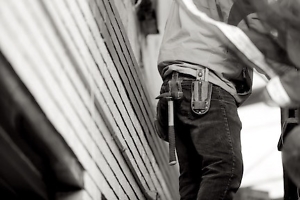
My husband and I went through a big Fargo phase, but eventually I had to stop. It was the same story, over and over again. These people made one terrible mistake and then, instead of correcting course, they kept going, burying themselves in bad choices.
Sometimes I think about the amount of willpower it takes not to do that. To not let your shame about one mistake dictate the way you live the rest of your life. I think about what it must have taken for Harold to try to start a business in our town with all the baggage he had there. To come back out of the shadows and try to be a normal citizen.
When my sister got married at the local tennis club, she invited Harold as a gesture, not really expecting him to show up. But he did, halfway through the reception and covered in paint. I am still awed by the courage of that.
***
I’m a product of the #metoo movement. I want men to pay for their crimes, and I want to be alerted to danger. So I don’t know what to do with Harold, who was lumped into a category with rapists, molesters, and god-knows-who-else, leaving us all to speculate about exactly where on the spectrum of offenders he fell.
And who I also knew personally to be good and kind and trustworthy.
When I was a teenager and practicing for cross-county, I ran on the secluded back road behind our house. Men in pickups whistled at me, and in one spot on my route, a pack of mean dogs always barked and growled, chasing me and sometimes nipping at my ankles as I tried to jog by them. My dad taught me how to yell, “GIT!” as loud as I could and throw gravel in their direction until they’d leave me alone.
But sometimes I look back and wonder what would have happened if I’d stumbled. Or if my wavering, high-pitched yells didn’t scare them.
Or if the pickup drivers had done more than whistle.
Or if Harold had ever wanted something more than affirmation.
***
I married a Nashville native, and today we live in the privileged suburbs that huddle around the city. The elementary school my kids are zoned for boasts an indoor climbing wall and a computer lab full of iMacs. My children have hardly encountered a pile of wayward dog poop — lest the labradoodle owners in our neighborhood face the wrath of the HOA — much less a dozen stray mutts at once.
I’m glad they’re safe, but I fear they’re missing some essential lesson I absorbed from Harold and my parents: that our fates are bound up with the people around us. That the point of life is to give it away.
***
The next time Harold’s picture ran in the paper, it was an obituary.
I didn’t go to his funeral, but my parents did. An honor guard performed a 21-gun salute, and I think he would have liked having a fuss made over him in that way.
But because I’m also a product — however ambivalent — of this Baptist land, as much as #metoo, I can’t help but hear all the old hymns about our sins being washed away forever. I don’t know how the town reconciles their years of public shaming with these beliefs.
Oh, precious is the flow that makes me white as snow. No other fount I know, nothing but the blood of Jesus.
And I can’t help but see a tomb with the stone rolled away when I think about that old garage. Cleaned, aired out, washed white as snow. Empty.
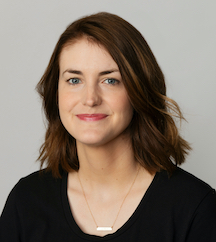
Copyright © 2022 by Caroline Siegrist. All rights reserved. Caroline Siegrist is a Nashville-based writer. Her work has been featured in The Washington Post, Rock & Sling, Mockingbird, Hippocampus, Cool Mom Picks, and more. She lives with her husband and two young children.
